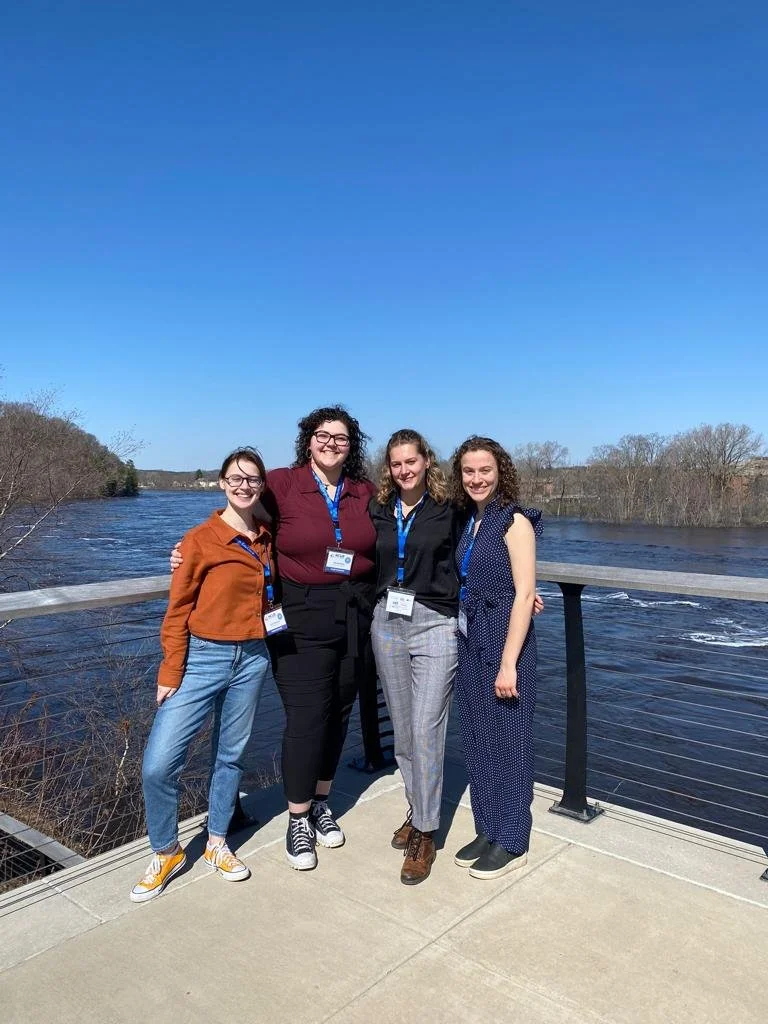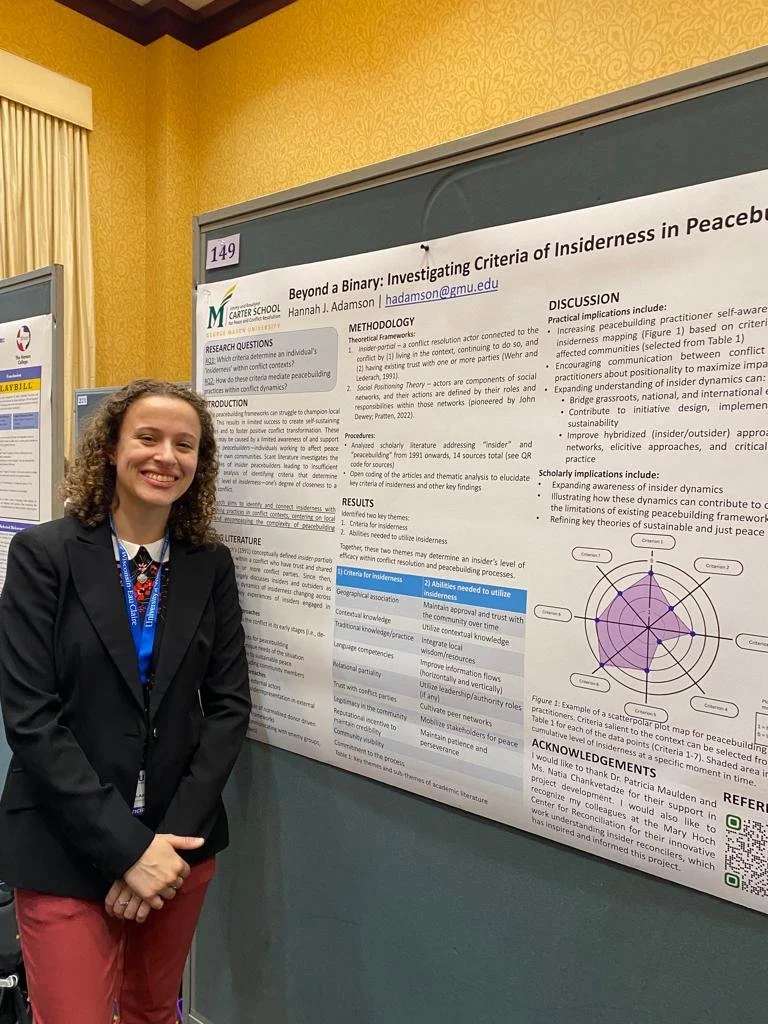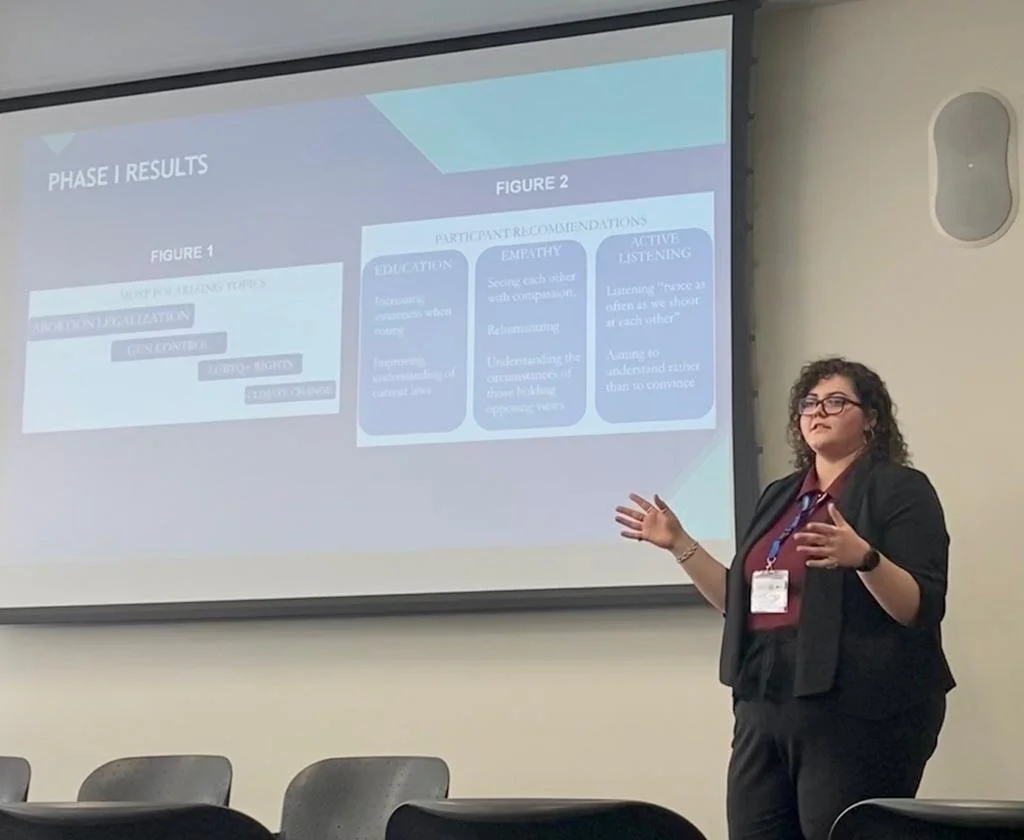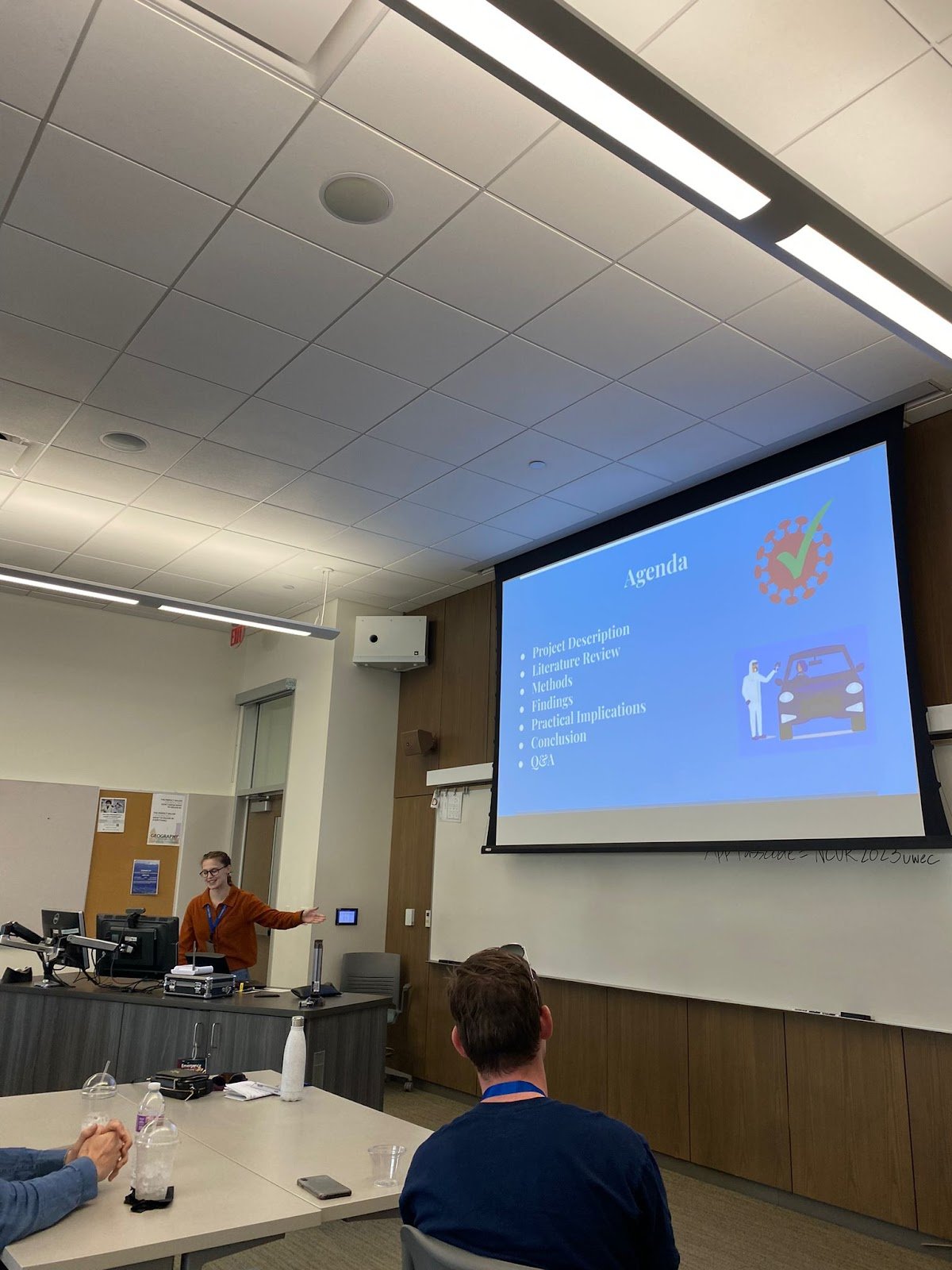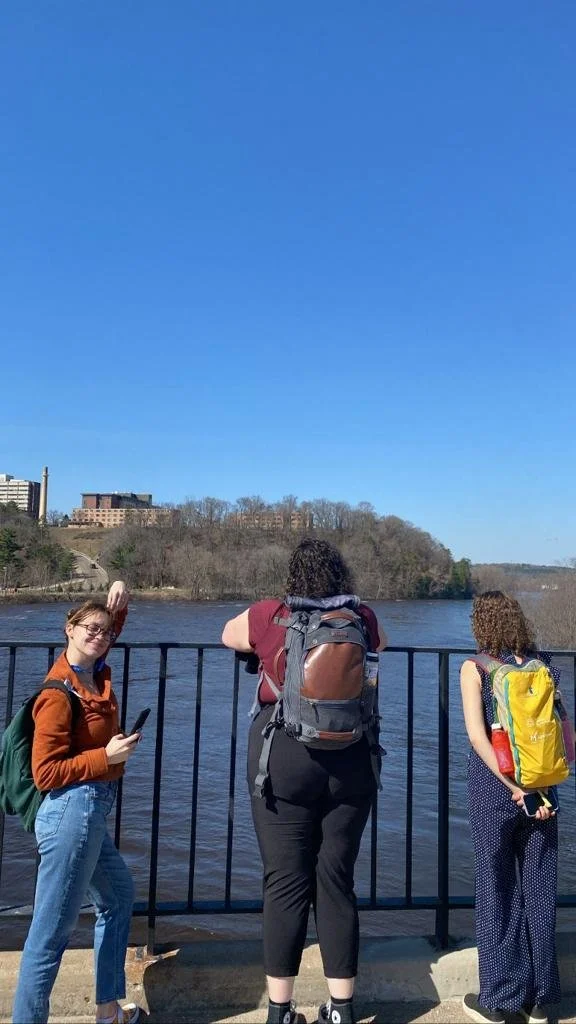By: Hannah Adamson, Merisa Mattix, & Greta Roberson
In the Summer of 2022, all MHCR undergraduates were awarded research funds through the Undergraduate Research Scholars Program (URSP) within George Mason's Office of Scholarship, Creativity, and Research (OSCAR). Expanding from this, these awardees–Hannah Adamson, Merisa Mattix, and Greta Roberson–applied and were accepted to present at the 2023 National Conference for Undergraduate Research (NCUR) in Eau-Claire, Wisconsin. This conference included 3,600 undergraduate students and faculty from across the country. The MHCR students reflect on their experiences presenting and participating in the conference:
Hannah Adamson:
I was excited to attend NCUR to present my project entitled, “Beyond a Binary: Investigating Criteria of Insiderness in Peacebuilding.” This project evolved from my continued work on the collaborative Insider Reconcilers research study within the Transformation and Reconciliation Lab (TRL), my 2022 URSP project, and my undergraduate capstone research course. This research project works to improve peacebuilding practice by fostering reflective practice through re-imagining the positionality of insiders and outsiders in conflict. While previously considered as either connected to—inside—a conflict or not connected to—outside—a conflict, practitioners more often fall somewhere in the middle. My project worked to identify what these forms of connection—criteria of insiderness—were through analyzing existing peacebuilding scholarship and practitioner writings. In short, some of the identified criteria include shared language, cultural practices, geographical association, contextual knowledge, and the ability to utilize reputation and trust throughout peacebuilding processes. To understand the level of connection to a conflict context and inform decision making, I developed a sample mapping tool in which practitioners can rank themselves from 1 (very connected) to 5 (not at all connected) on one or more of the insiderness criteria identified. With this initial understanding of their level of insiderness in a conflict context, practitioners may better be able to identify when to rely on their insiderness for peacebuilding processes, become more aware of their biases, consult local communities for insight, and determine when less connected third-parties are needed. As a budding scholar-practitioner, my goal of this project is to contribute an applicable theoretical model and practical tool to improve reflective practice that empowers community members to facilitate positive change and highlights opportunities for collaboration within and across peacebuilding processes.
Presenting at NCUR allowed me the opportunity to engage with students across disciplines and backgrounds which enabled me to practice sharing my research with people outside the peacebuilding field. Listening to people’s questions and reactions to my project was also informative to the continued development of this project as I anticipate expanding this research into a Master’s thesis. Furthermore, I appreciated the opportunity to listen to several other students present their impactful research and attend keynote sessions that highlighted diversity, resilience, and the power of collaborative action. Ultimately, this conference energized me through the connection with similarly motivated students researching areas of impact, was a significant milestone at the end of my undergraduate career, and has excited me to continue my research journey through my thesis and future graduate research conferences.
Adamson & her research poster, author's’ personal collection.
Merisa Mattix:
The research I presented at NCUR meant a lot to me and has informed much of how I see the current state of political polarization in the United States. For this conference, I presented “Are We Achieving Unity? Comparing Current Initiatives Addressing Political Polarization with Community Experience'' is a two-stage study that started with the Office of Student Scholarship, Creative Activities, and Research’s Undergraduate Research Scholars (URSP) program, which I participated in in the Summer of 2022. I then conducted the second research stage as my undergraduate capstone for the Carter School.
For the first stage, funded by the URSP, I traveled to Lake Charles, Louisiana, where I conducted 9 semi-structured qualitative interviews with leadership and congregants at a more conservative church and a more progressive church. These interviews were combined with ethno-informed methodology, including reflections on 6 church services I attended and other aspects of living in Lake Charles for about 2 months. I asked participants about a) their definitions of political polarization, b) if and how it has affected their community, and c) their recommendations for how their church or community could help address political polarization. Overall, participants were concerned about the division that political polarization had created within their families, friendships, and the wider community. Their recommendations were centered around better training for respectful and productive dialogue between those who disagree with each other.
In the second stage, I was curious if nonprofits addressing political polarization in the United States had missions aligned with the recommendations I had received from my participants in the first stage. I collected as many mission statements as possible from nonprofits’ websites to find this out. I looked at non-profits who worked on a national scale, as well as those in Arizona, Louisiana, and Virginia. As I have personal experience with each of these states and had data from Louisiana, it was fascinating to compare popular missions of voting accessibility, equality issues, and engaging young voters with the recommendations and requests for dialogue from Stage 1 participants.
I looked forward to presenting at NCUR because it was my first time at a traditional research conference. It was also my first time in a traditional poster session as well as presenting at a roundtable session. The poster session allowed for great one-on-one conversations with those interested in the implications of a project on political polarization. I was able to meet other researchers with contributions to work that could address political division in the future. I especially appreciated the roundtable session, though, as I was challenged to compare and relate my research to that of other presenters and gather insights from our separate projects and the combined results. Overall, I appreciate NCUR as a space to expand my knowledge and understanding of so many research fields while actively engaging in the debate and deepening the potential impact of my research if I continued with the topic or used it to inform community-building programs in the American context. I am grateful NCUR was the “cap” of this phase of my research journey.
Mattix presenting on her research, authors’ personal collection.
Greta Roberson:
Presenting at NCUR this past April was an incredible experience. It was the final, finishing touch to present my project on the “Impact of COVID-19 on an International Sample of Religious Leaders: Challenges, Sources of Resilience, and Unmet Needs.” The Al Amana Centre, an interfaith peacebuilding organization based in Muscat, Oman, brought the project to MHCR for conceptualization. Once I joined the MHCR research team, I was tasked with concluding the project. I was able to complete the literature review, conduct and transcribe the final interviews, and construct the final reports. And thankfully with the support of URSP funding, I was able to complete these tasks.
From the 11 interviews with religious leaders from various parts of the globe, we found that religious leaders faced increased demands while places of worship struggled financially. Many had mentioned feelings of helplessness or isolation from their loved ones and congregation. Nevertheless, those we interviewed had mentioned how they turned to sacred texts and found deeper religiosity, spent more time with family and on meaningful projects, and found new ways to grow spiritually and serve their congregation in new ways. Regardless, not all challenges were met with equal solutions or sources of strength. Some of their unmet needs were the ability to adapt to online spaces and feeling “always on call” for work, family activities, and their congregation alongside job or asset loss, and rectifying “double-losses.” Double losses can be described as losing a loved one and not being able to properly mourn for them due to COVID restrictions.
To address these challenges, I proposed a series of policy recommendations following this pandemic and in the face of future pandemics and similar global crises. These include enacting cultural mandates, promoting collaboration between faith groups and relevant organizations, providing targeted resources and materials, and distributing grants or specialized loans to offset the decrease of donations and increase of costs. The findings and recommendations were compiled into two separate reports: a guidebook for the Al Amana Centre to distribute amongst their network of religious leaders, and a policy brief for the United States Institute of Peace (USIP).
It was an incredible experience for my last semester at George Mason University. Presenting at NCUR was the perfect way to end the project because it enabled me to share my experience and research with an incredibly receptive audience of my peers. It was incredible to see what other students are creating outside of my field. For instance, I saw many student presentations on hopeful new ways of tracking diseases, offering sustainable alternatives to chemical fertilizer, or creating incredible robotic designs. This was just the first of many and I am glad that I was able to partake during my undergraduate career so I have this experience moving forward. I am excited to see where my research takes me next as I enter graduate school abroad.
Roberson presenting her research, authors’ personal collection.
Conclusion:
Overall, presenting at NCUR was a significant milestone of the research each of MHCR’s undergrads has completed in their time at MHCR, especially as their first large in-person conference after the pandemic. The sponsorship of their projects as well as our travel to NCUR offered opportunities to learn tremendously from other undergraduate researchers and improve our presentation and networking skills. Hannah, Greta, and Merisa express their gratitude to OSCAR for their support and funding to attend the conference, especially Dr. Karen Lee. Now shifting to graduate school, these MHCR students are excited to apply their refined research skills and presentation experience to future projects and professional endeavors.
Roberson, Mattix, and Adamson, authors’ personal collection
